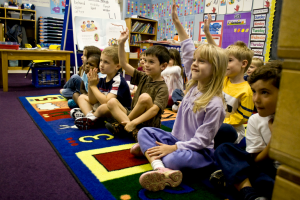
Kindergarten is fun by woodleywonderworks (flickr) CC BY 2.0
With the new school year well under way for most, many parents will see their first cases of back-to-school colds, flus, and stomach upsets. As kids are coming into close contact with their peers again, their exposure to new viruses and bacteria increases.
These illnesses help strengthen the immune system and build up resistance, it’s perfectly normal to be ill, especially the first few weeks of a new school term (just ask any teacher). However, there are things parents can do to stave off runny noses, and if you child does get ill, the recovery time can be reduced by following some simple advice.
Bedtime routines
Sleep is essential for growing bodies and busy minds. Experts recommend young children and preteens get 10-12 hours sleep a night while teenagers should be getting 8.5-9.5 hours. This can sometimes be impossible, especially for teenagers with homework, after school activities and other distractions but studies have shown children who do not get enough sleep are distracted in class and perform at a lower level in tests. Lack of sleep also weakens the immune system making it harder to fight off back to school bugs.
Parents should try and ensure a sleep routine is adhered to during term time, especially for younger children. Computers, TVs, and mobile phones in the bedroom have also been blamed for youngsters not getting enough sleep. If you suspect your child is spending time online or watching TV after lights out consider taking the offending device out of the room.
Zinc boost
A healthy, balanced diet is essential for warding off winter sniffles and some foods are better than others at boosting your immunity and keeping colds and flu at bay. “You can’t underestimate the importance of good nutrition when it comes to…your immune system,” says Karen Ansel, RD, a spokesperson for the Academy of Nutrition and Dietetics.
Zinc has been proven to help fight the common cold. While oysters are one of the best sources of zinc, they’re unlikely to go down well with your kids. Instead consider beef and lamb, both rich in zinc. Other great sources are pumpkin seeds, spinach, and even cocoa and dark chocolate.
Hand-washing vs. antibacterial gels
Many schools these days list antibacterial gel on the essential items to be included in your child’s back-to-school kit. However, studies show it is no more effective against preventing illness than soap and water.
All children should be taught to wash their hands after using the bathroom, and before eating. Soap and warm water should be used where possible and hand-washing should last the length of time it takes to sing the song “Happy Birthday” through twice.
When to stay home
It’s more than likely your child will catch a cold or virus this school term. If they are ill, deciding whether they should stay home or are well enough to go to school can be a tough call. According to parenting.com your child should stay home in the following situations:
- Fever – Temperatures above 38ºC (100.4ºF).
- Vomiting – More than twice in 24 hours and showing signs of dehydration.
- Sore throat – Accompanied by headache, fever, stomachache or swollen glands could indicate strep throat.
- A cold – Accompanied by fever, lethargy, and/or wheezing.